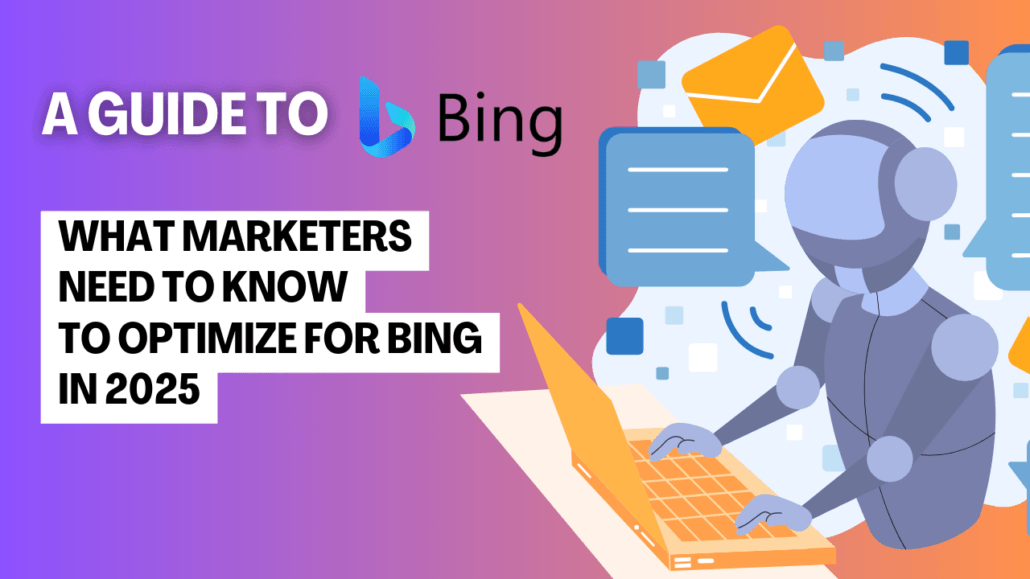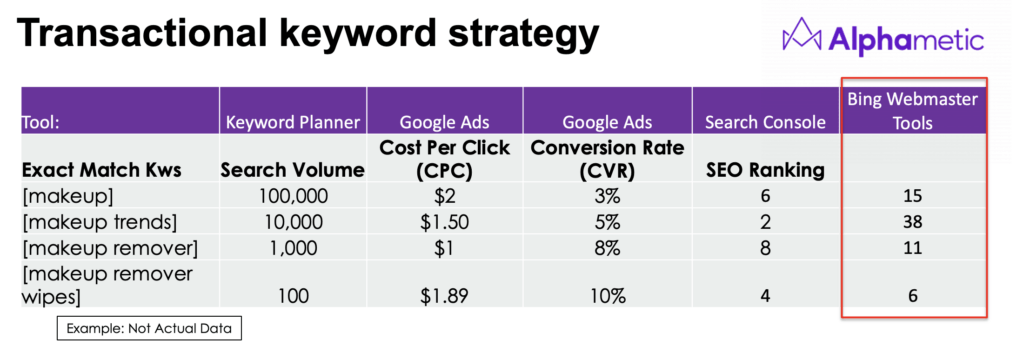A Guide to Bing SEO: Optimize for Bing to Rank on ChatGPT
Just as Google has evolved over the past few years, Bing has also made major advancements in its AI search reach and capabilities. In 2025 and beyond, optimizing for Bing SEO is more crucial than ever, as Bing powers ChatGPT’s live search rankings—directly impacting which brands are recommended in generative AI answers. With more users relying on ChatGPT for commercial queries—such as brand recommendations or comparisons—businesses that rank well on Bing gain a competitive edge, increasing their chances of being surfaced as trusted sources in AI-generated search results.

While it might seem that Bing simply aims to copy many of Google’s features, there are some key differences and ranking factors all marketers should keep in mind when strategizing their Bing SEO strategy. By focusing on best practices for Bing SEO, businesses can enhance their visibility not only in search results on Bing.com (and its search partners, like Yahoo! and AOL), but also in AI-generated answers on ChatGPT, driving more traffic and conversions in an increasingly AI-first digital landscape.
The Cross-Platform Share of Search
The chart below illustrates the Cross-Platform Share of Search per a recent study conducted by SimilarWeb, Sparktoro, and Datos. While it shows Google’s dominant market share at 83.54%, alternative search platforms, particularly ChatGPT (4.33%) and Bing (1.97%), collectively hold 6.33% of the search market, which is growing rapidly due to the rise in popularity of ChatGPT and AI. YouTube (6.79%) also plays an important role in search behavior. According to a study by NP Digital, Google ChatGPT has gained 30% in market share growth in terms of “question keywords” and is chipping some of that away from Google.
Here are the key takeaways as to why you should pay more attention to Bing (and ChatGPT) in your SEO strategy:
- AI-Driven Search is Expanding: ChatGPT’s 4.33% share signals a gradual shift toward AI-driven search experiences. More users are turning to ChatGPT for answers, product recommendations, and commercial queries, reducing reliance on traditional search engines. Some studies show that 30% of searchers turn to AI Chats when they search for questions online.
- Bing’s Role in AI Search: While Bing itself holds 1.97%, its integration with ChatGPT means businesses optimizing for Bing SEO will gain visibility in both Bing search results and ChatGPT-generated responses.
- Challenges to Google’s Dominance: While Google remains the leader, the rise of ChatGPT and Bing suggests search behavior is diversifying. Businesses must now optimize across multiple platforms—including AI-driven search—to capture audiences beyond Google.
Strategies for Bing SEO
Now that you understand the “why,” it’s time to dive into the “how.” Check out our Bing SEO Guide—your ultimate playbook for ranking at the top, not just on Bing, but also on ChatGPT’s AI-driven search results. From desktop-first indexing to the importance of verifying your website on Bing Webmaster Tools, there are a few fundamental differences in SEO for Bing you need to know about. But the biggest opportunity is to leverage data from other sources, such as Google, to inform which transactional keywords are crucial to rank in the top 10 on Bing and also in AI chats.

One big update was the creation of ChatGPT Search. You can now go directly to ChatGPT and press a new “Search” button, which will pull up ChatGPT results with citations from the web. As you can see, Chat GPT’s search features are primarily powered by Bing Search. The citations given by ChatGPT are also the top search results that appear in Bing’s search browser and rich features. Another big update is that OpenAI has launched a new crawler called OAI-SearchBot, aimed at improving its search functions within ChatGPT. While we don’t recommend this option, if you prefer to block OAI-SearchBot from indexing your site, you can disallow it in your robots.txt. This will prevent the OpenAI crawler from accessing your site if you have a valid reason to be excluded. If you want OAI-SearchBot to index your website, ensure there is no disallow directive for it in your robots.txt. It’s important to differentiate this new bot from GPTBot, which OpenAI uses for content understanding and training its models. OAI-SearchBot is specifically for indexing content to be displayed in search tasks and not for training its model.
Bing and Google are similar on the surface with common features such as Local Packs, Rich Snippets, and even AI features. However, there are some key differences between presentation and information that can offer insight into how Bing operates.
Key Differences Between Bing and Google
- Use of AI: Bing uses OpenAI’s GPT-4. Google does not, although Google has Gemini and its own proprietary AI capabilities. Chat GPT is more widely used than Gemini. ChatGPT currently holds 59.2% market share in the generative AI chatbot space, while Google Gemini only holds a 13.5% share.
- Maps: While Google Maps generally predicts longer travel times, it provides more comprehensive information about your chosen route compared to Bing Maps.
- Image Results: Google features a broader array of images, but Bing’s images are of higher quality and include more detailed information.
- Special SERP Features: Google offers specialized SERP features like Google Scholar, adding value to its search capabilities.
- Broader Local Search Radius: In terms of local search, Bing scans a broader mile area, while Google focuses on closer, more proximate listings to the user.
- Voice Search: Regarding voice search capabilities, Google Assistant demonstrates better understanding of linguistic nuances, whereas Microsoft’s Cortana excels in speech recognition accuracy.
- VPAs: Voice-powered assistant (VPA) responses on devices like Google smart speakers exclusively utilize Google search results, whereas Bing powers the responses for Siri, Cortana, and Alexa.
- SERP Ads: Bing displays fewer ads on its search engine results pages compared to Google.

It’s important to understand these differences when optimizing for Bing SEO to ensure your content resonates effectively across different search platforms.










